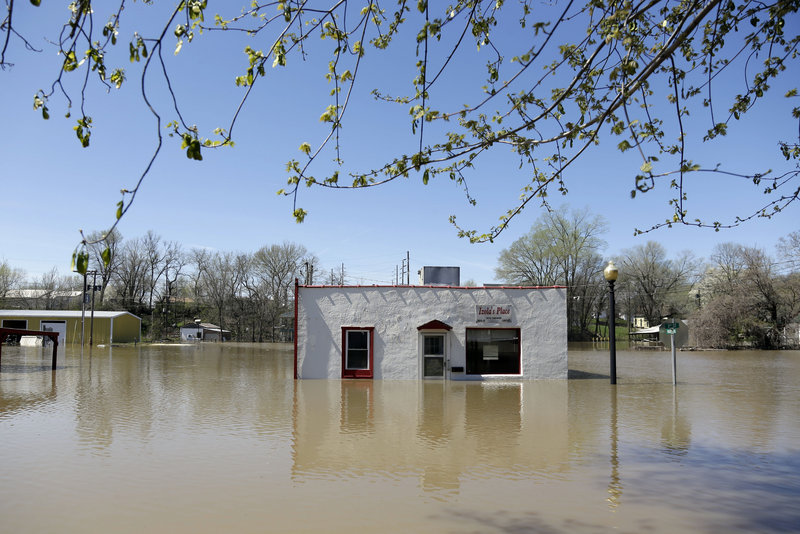CLARKSVILLE, Mo. – The fast-rising Mississippi River was making travel difficult Saturday, both on the river and for those simply trying to get across it.
The Mississippi, Missouri and other Midwestern rivers in at least six states have surged since torrential rains drenched the region over the last few days. At least two deaths are blamed on flash flooding and a third was suspected, while crews in Indiana were searching for a man whose car was swept away.
The National Weather Service predicted what it characterizes as “major” flooding on the Mississippi from the Quad Cities through just north of St. Louis by this weekend, with similar projections further south into early next week. Some smaller rivers are expected to see record flooding.
People in and around Louisiana, Mo., about 95 miles north of St. Louis, were facing potential travel woes after the Champ Clark Bridge was closed Saturday due to water overtaking the approach on the Illinois side. It was the second Mississippi River crossing to close in two days — one of the two bridges at Quincy, Ill., closed on Friday.
To get across the river, people in the Louisiana, Mo., area either had to drive 35 miles north to Hannibal, Mo., or 50-plus miles south to suburban St. Louis. Penny Scranton’s normal 13-minute commute from Rockport, Ill., to the BP convenience store in Louisiana, Mo., turned into an hour-and-a-half.
The store manager chose to look at the bright side: Her employer pays her mileage.
“There are others worse off,” she shrugged.
Among those is Erica Campbell, whose rented home in a low-lying area was flooded for the second time in three years. This time, she’s had enough. Campbell, her husband and their eight kids are packing up.
“We’re planning to move to the country — as far away from water as I can get,” the 35-year-old said.
If crossing the river was difficult, traveling it was essentially impossible. The water was moving too swiftly, prompting the Army Corps of Engineers to close most of the locks between the Quad Cities and near St. Louis. Barge traffic was at a standstill, slowing the movement of items such as coal, grain and other goods.
In Hannibal, Mo., — Mark Twain’s hometown — a steady stream of tourists climbed atop the earthen levee for a look at the river. Steve Terry, owner and captain of the Mark Twain Riverboat, has put excursions on hold since Thursday, with no end in sight.
Downriver, volunteers pitched in to help hold back the bulging Mississippi River from Clarksville, Mo. The skies had cleared, but murky river water was creeping dangerously close to the quaint downtown of antique stores and artist shops.
Filled sandbags were stacked between the river and downtown. Farmers, National Guardsmen and even prison inmates from Algoa Correctional Center in Jefferson City were reinforcing the makeshift levee to protect against seepage.
Clarksville’s flood stage — a somewhat arbitrary term that the NWS defines as the point when “water surface level begins to create a hazard to lives, property or commerce” — is 25 feet. By Saturday afternoon, the river was at 34.2 feet and expected to rise another 2 feet by Sunday.
Gov. Jay Nixon toured the damage and lauded the resilience of the town.
“It’s a hard flood fight in Clarksville but it’s a flood fight that’s going to get won,” he said.
Roger Dowell has twice lost mobile homes to flooding, and his latest one is again surrounded by water. On Saturday, he needed a front-end loader to get to and from his home. His wife stayed inside, packing up photographs and keepsakes.
“It came up fast — faster than normal,” Dowell, a city maintenance worker, said.
Mississippi River levels vary greatly but are typically highest in the spring, so minor flooding is not uncommon. But when river levels exceed flood stage by several feet, serious problems can occur.
Smaller rivers were swelling, too. In Illinois, heavy equipment manufacturer Caterpillar will shut down its East Peoria factory Sunday as the Illinois River approaches an expected 30-foot crest early next week.
More than 200 people were evacuated along rivers in Indiana. The Wabash River in Tippecanoe County topped 14 feet above flood stage Saturday, the highest level since 1958.
Indiana Gov. Mitch Pence took a helicopter tour Saturday of Kokomo, Tipton and Elwood, the first step toward determining if a disaster declaration might be needed.
In Grand Rapids, Mich., high water forced the evacuation of the Courtyard Marriott Hotel and an apartment building on Saturday.
Send questions/comments to the editors.



Success. Please wait for the page to reload. If the page does not reload within 5 seconds, please refresh the page.
Enter your email and password to access comments.
Hi, to comment on stories you must . This profile is in addition to your subscription and website login.
Already have a commenting profile? .
Invalid username/password.
Please check your email to confirm and complete your registration.
Only subscribers are eligible to post comments. Please subscribe or login first for digital access. Here’s why.
Use the form below to reset your password. When you've submitted your account email, we will send an email with a reset code.